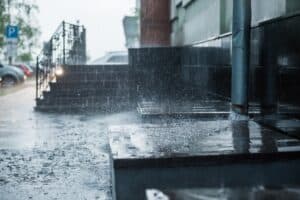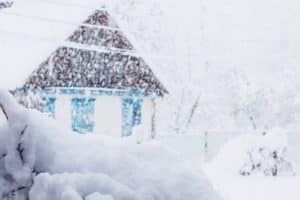The climate in GA can produce inclement weather that can severely damage your rental property and create havoc for you as a landlord. A good property management company knows that heavy rain, extended periods of saturating rain, tornados, hurricanes, hail, and extreme high and low temperatures can all create major problems which can cost thousands of dollars, an increase in insurance costs, failure to provide a safe and habitable home, and displacement of a tenant. It’s important to understand the risks associated with inclement weather and what preventative measures should be considered to protect your investment, your pocket book, and the services being provided to the tenant. In this article we will discuss the risks and preventative measures that should be considered.
 Heavy rainfall is common in GA and sometimes can last for hours giving us 2-4″ in just a few hours. Heavy rain and thunderstorms is the most common issue we run into for creating events in the homes we manage due to the condition of the exterior of the home and the landscaping.
Heavy rainfall is common in GA and sometimes can last for hours giving us 2-4″ in just a few hours. Heavy rain and thunderstorms is the most common issue we run into for creating events in the homes we manage due to the condition of the exterior of the home and the landscaping.
For heavy rain, ensuring that your roof, siding, soffit, fascia, and windows are all in good condition is crucial. Regular inspections and maintenance can help identify any weak spots or damage that could lead to leaks during heavy rain. If overlooked or neglected these leaks can lead to more costly repairs as the water will begin to damage inside the walls, impacting the studs and structure of the home, as well as the interior of the home, including drywall, flooring, trim, baseboards, etc. If neglected for long periods of time, not only will this cost significantly more to repair then keeping up with the exterior, it has the potential to create an unhealthy living environment. Wind damage is a common issue for roofs in GA. Having your roof checked by a roofing specialist on a regular basis will help to ensure you don’t have any area’s that are not sealed which can create water entry.
Not only is sealing up the exterior to the common elements of the home important, making sure you have proper sized gutters and downspouts that can handle heavy rain, will keep them from overflowing, which can put too much water up against the foundation of the home, causing water intrusion. Gutters should be cleaned regularly and ensure there are proper kick outs and extensions on the downspouts to make sure water gets away from the foundation.
Landscaping is another key element to consider in dealing with heavy rain and storms. The grading around the home can change due to erosion and the backfill up against foundations can settle over time. This can create pockets up against the foundation of the home where water doesn’t have a way out due to improper grade which can also create water intrusion.
Trees and Shrubs should be kept away from touching the home for many reasons, such as pests, roots impacting the foundation etc. but also so that they don’t rub up against the home during heavy winds that can create damage to the structure or roof shingles which exposes the home to water. Keeping an eye on trees for large dead branches, signs of unhealthy trees or leaning trees toward the home is important to avoid a catastrophic event.

If your heating and air systems shut down during excessive temperatures this creates a potential health risk to the tenant residing in the home. These issues must be addressed as fast as possible as it may not be safe for them to stay in the home. During these times is also when HVAC companies tend to be extremely busy as they are flooded with new service calls during excessive temperatures. If the HVAC company can not restore your heating and air quickly due to availability you will have an unhappy tenant and one that will likely request alternative living arrangements until the Heating and Air can be restored. To avoid this situation the system should be maintained properly and clean air filters should be changed regularly. It is important to ensure the tenant understands their responsibility to change the air filters. Dirty air filters put stress on a system and when temperatures are extreme the system is more likely to break down as it is working overtime to try to heat or cool the home without being able to breathe. Providing easy access, proper air filter sizes, locations, and easy access to replace filters will help ensure a tenant will change the air filter. If they don’t know where the air filter is, it is difficult to get to, requires tools, and it is not easy to change, the tenant will likely struggle to replace them as needed or not at all. Secondly, having regular seasonal tune ups from a heating and air company will ensure proper operation and will also give 2 times per year a check in to ensure tenants are changing air filters, all which will help keep your system from breaking down. Proper insulation in the attic can also help maintain a home’s temperature and put less wear and tear on your HVAC system especially during extreme heat or cold.
During excessive freezing temps, the home should be winterized to avoid freezing pipes. Sending a reminder to your tenants several days in advance, when extreme weather is approaching to take preventative measures, can help avoid a problem. It is important they know where the main shut off valve is located as well as all exterior hose bib valves to shut down during the winter months. We recommend placing tags on each valve throughout the home so they know which valve controls which fixture so they can quickly and easily turn them off. We also recommend reminding them of important steps to take to help avoid a problem. These preventive measures should include, dripping faucets, opening doors to cabinets with plumbing, allowing warm air into non temperature controlled area’s of the home that may contain plumbing lines, adjusting the thermostat, making sure air system filters are clean, and what to do in the event of an emergency. Sending these reminders to tenants informing them of their responsibilities to protect the property as well as what should be done to help prevent a problem will increase your chances of avoiding a problem.
 Taking preventive steps to seal up the exterior of the home, maintaining the landscaping, periodic inspections, regular HVAC service, and proper communication to the tenant so they are aware of their responsibilities as well as preventative steps they can take during inclement weather are all important action items that should be considered. All of these items should be revisited regularly and ongoing to protect your rental property. As property management company we regularly see owners who decide to defer maintenance and don’t take these precautions seriously. It is only a matter of time before preceding in this fashion creates an event costing more money, increases insurance costs, or displaces a tenant. A seasoned and savvy investor will take heed and take steps to ensure the rental home is well protected to avoid these common pitfalls due to inclement weather.
Taking preventive steps to seal up the exterior of the home, maintaining the landscaping, periodic inspections, regular HVAC service, and proper communication to the tenant so they are aware of their responsibilities as well as preventative steps they can take during inclement weather are all important action items that should be considered. All of these items should be revisited regularly and ongoing to protect your rental property. As property management company we regularly see owners who decide to defer maintenance and don’t take these precautions seriously. It is only a matter of time before preceding in this fashion creates an event costing more money, increases insurance costs, or displaces a tenant. A seasoned and savvy investor will take heed and take steps to ensure the rental home is well protected to avoid these common pitfalls due to inclement weather.


